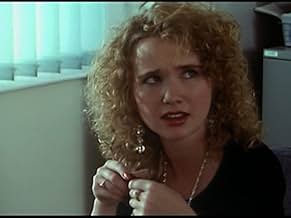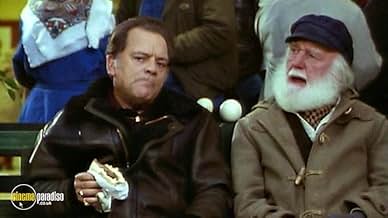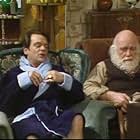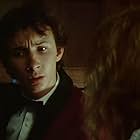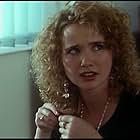Rodney and Cassandra's marriage is in trouble - Cassy is ambitious and wants to better herself with her banking colleagues, while Rodney is set in his ways and expects her to be an old-fashi... Read allRodney and Cassandra's marriage is in trouble - Cassy is ambitious and wants to better herself with her banking colleagues, while Rodney is set in his ways and expects her to be an old-fashioned housewife. After a bust-up, Rodney decides to leave and return to the Trotter househo... Read allRodney and Cassandra's marriage is in trouble - Cassy is ambitious and wants to better herself with her banking colleagues, while Rodney is set in his ways and expects her to be an old-fashioned housewife. After a bust-up, Rodney decides to leave and return to the Trotter household. He still yearns for her though, and is unwisely advised that making her jealous might ... Read all
- Disc Jockey
- (uncredited)
- Neighbour
- (uncredited)
Featured reviews
Taken on face value this is a good episode that will lead nicely into the events of Series 7 and beyond. It's an episode that moves the characters along to the next stage of their lives.
If I had sat down to watch this on Christmas Day 1990 though I might have been a bit underwhelmed, because while there are lots of nice moments, it is also quite a downbeat affair. Anyone expecting another 'Jolly Boys Outing' style romp will be disappointed.
I always enjoy it though every time I watch it, and the genius of John Sullivan shines through.
The events here are set 18 months later, & deal with the cementing of Del & Racquel's relationship, & the unfortunate break-up of Rodney's marriage, culminating in him returning to the Trotter household (after a distrastrous attempt by Del to intervene by suggesting Rodney ask another girl to the 'pictures' to make Cassandra jealous) - all ready for season 7 to unfold the following week. In that respect, this episode is best viewed chronologically, & not in isolation - as it doesn't make so much sense otherwise. There's less stand-out humour here too, as it's more a scene-setter for the following season of episodes.
The plot is far more relationship-based than usual - so as such, we see less of the usual cast (other than Rodney's friends - no Boycie, Trigger etc.), &, rare for an OF & H special, no scenes at all in the Nag's Head!
There's still a fair amount of the usual wonderful humour here to be enjoyed though - particularly Del's attempts to sell tiny tears-type dolls from his suitcase in a crowded shopping centre. Cassandra and Rodney's scenes are hilarious too, as they both accuse each other of being childish & fail to agree on anything - similar in style to the writer's earlier 'Just Good Friends'.
Though not quite classic OF & H, this is is definitely a must for completists, & for anyone wishing to view the episodes chronologically in order to follow the storyline through.
The Raquel / Del relationship maybe takes a bit of getting used to at first but I can buy into it.
This isn't the funniest episode by any means, and the ending is actually a bit of a downer, but it works well for me and is enjoyable in many other ways. There's more to OFAH than a few laughs. It's what separates it from the rest.
If Rodney Come Home admittedly feels a bit mismatched as a Christmas special, taken as a standard episode it is excellent. In its examination of shifting gender politics, male insecurity and the class divide, it hits most of the major hot button issues that really ignite Sullivan's talents. Only Fools and Horses was growing up and it acknowledged that fact with an episode, and subsequent series, about how hard it is to grow up. Spotlighting Rodney and his faltering marriage, not to mention his attempts at a career, Rodney Come Home begins at a point where the Only Fools world has become very different. But through a series of unfortunate events, Sullivan was able to get Rodney back in the flat and working for Trotter's Independent Traders again, and do so convincingly. With Cassandra and Raquel now playing a major role, the series was bound to change a little but Sullivan managed to find a way to preserve the central dynamics without having to force it, as he ultimately would with the ill-advised comeback trilogy at the start of the 00s.
Rodney Come Home begins with a scene of Rodney attempting to exert a small amount of authority over his secretary, something she evades by easily outwitting him. The callous way in which he speaks to her initially seems out of character but it soon becomes apparent that this seemingly throwaway scene is actually very important since it betrays Rodney's motivation for much of what happens in the episode. Sullivan was often very astute when probing the psychology of his characters but it was more often Del who came more closely under his microscope. But Rodney Come Home gives us an up-close look at Rodney's tragically minimal self-esteem, something Sullivan subtly links to his father abandoning him and his mother dying in a way which Rodney has subconsciously construed as abandonment too. After years of living in his brother's shadow, marrying Cassandra should've given him a boost but instead he is plagued by fears that she has "married beneath" her, and he attempts to redress the balance, first by trying to elevate himself by picking on his secretary, and then by devaluing himself by sabotaging his own marriage. This is largely subtextual but I was hugely impressed on returning to Rodney Come Home by just how effectively Sullivan layers it all in. Although Rodney and Cassandra are sometimes portrayed as being as bad as each other when it comes to childishness, Sullivan carefully highlights the main source of the tension between them through a clever metaphor involving a pair of small earrings.
As well as examining Rodney's psychological state, there's lots in Rodney Come Home about ingrained gender politics, something Sullivan began bringing to the forefront with the introduction of major female characters. The sexist attitudes of the Trotters had been realistically portrayed from the get-go but early on Sullivan was not always great at differentiating his characters' attitudes from his own. Too often he seemed determined to write as many gags comparing women to dogs as he could. This resurfaces in Rodney Come Home but in a very different light. Trying to dissuade Rodney from going on a date with another woman, Del begins spouting the sort of comments about dogs that can be found in the earlier episodes. But now, in Raquel, we finally have a female character present to challenge him. The speed with which Sullivan has her forgive him for the sake of making a joke work is a bit forced and he ultimately has Raquel apologise to Del rather than vice versa, but Sullivan cleverly shows that Del's sexist performance wasn't pure fakery in an unpleasant conversation he has with Albert before the scene. The Trotters are trying to grow but it is hard when certain attitudes have been so consistently passed down. When Raquel suggests Rodney is frightened, Del responds with "He's not frightened, he's a bloke." Given that Del raised Rodney himself, it is hardly surprising that he expects his wife to have dinner on the table, or that he is so reluctant to discuss his emotions that they fester and manifest as self-sabotage.
The astute psychological underpinnings do not mean that Rodney Come Home isn't also very funny though. Del has a good storyline about trying to invite Raquel to share his bed, while Albert gets a hilarious bit of business involving faking a shocked reaction. As the focus shifts to Del in the second half, his attempts to save Rodney's marriage are both touching and farcically funny as he runs from place to place trying to do the right thing and then clean up after his mistakes. Sullivan drops in a small ulterior motive for Del in the shape of the cheap printing he is getting from Cassandra's Dad, but the overwhelming impression is that Del is most concerned with Rodney's welfare and that his own interests merely add a greater urgency. In this sense, Rodney Come Home feels like the antithesis of the mean-spirited misfire A Royal Flush, in which Del destroyed Rodney's relationship for his own financial ends, only throwing in an unconvincing claim that he was actually protecting Rodney at the last minute.
With its lack of festive content, its bleak outlook and its backdrop of the usual Peckham locations, Rodney Come Home may not be one of the most well remembered Christmas episodes of Only Fools and Horses but it is one of the best-written ones. It easily folds into the subsequent series seven, which continued to explore Rodney and Cassandra's marital strife, and which is all the more effective for this introductory glimpse into Rodney's psyche.
Rodney Come Home is as you'd expect, extremely funny, with my personal favourite scene being where Del tells Albert to look horrified at Rodney going out with another woman, Buster Merryfield proves himself as a fantastic comedy actor in just that scene alone.
This and the Jolly Boy's Outing feel like a two part episode, with Rodney and Cassandra's marriage seemingly on the rocks in that episode, And Rodney Comes Home is what happens after.
This episode basically sets up Series 7 of the show, which is a Series long story arc about Rodney and Cassandra's marriage and how they try (or don't try) to fix it throughout that series.
Also in that series is the Del and Raquel story arc that is set up in the Jolly Boy's Outing, and continued in this episode as we see Raquel moved into the Trotter household.
Rodney Come Home does not end happily, Cassandra chucks Rodney out, and he's gone back to live with Del, and so begins Series 7.
Did you know
- TriviaSince 1996 all repeats and video/DVD releases of this episode have censored one line from the scene in which Del tries to dissuade Rodney from dating Tanya. When talk turns to the risk of contracting AIDS, Del said "one wrong move and you could be shaking hands with Princess Di!" Although some channels still contain the line
- GoofsDel and Raquel are having a candlelit dinner when Albert appears from the bedroom pulling tufts of his beard that have been singed by the candle. Some of these tufts land on his vest. Two scenes later- apparently at least a day has passed- he and Del are discussing Rodney's date and some tufts may still be seen on Albert's vest. Either Albert rarely changes clothes or the beard tufts were not fully removed between scenes.
- ConnectionsReferences Lassie Come Home (1943)
Details
- Runtime1 hour 13 minutes
- Color
- Aspect ratio
- 1.33 : 1

